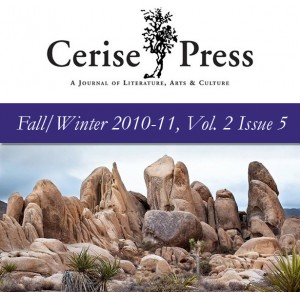Cerise Press | Vol. 2 Issue 5 | Fall/Winter 2010-11
Nietzsche once wrote: “That for which we find words is something already dead in our hearts. There is always a kind of contempt in the act of speaking.” This dilemma poses a particular challenge to new poetry: can one ever speak truly—much less write?, much less sing?—when language is a prejudice of precedent, when there is nihil sub sole novum and all sayable things seem already said? This question is also poetry’s great virtue, for no other medium is so self-aware and self-justifying. Successful poems are their own apologia, and, by exhausting the fecundity of words, strike at the experience of mystery that lies behind words. I want to keep this in mind while examining some of the poems in Cerise Press‘s fall/winter issue. Every poem published in this issue is written with a mature handle on craft, which means each is already pushing the limits of the medium and approaching quiddity. The poems are of high quality, and for me to select one over another will be merely a matter of taste. For this reason, rather than praise what is already self-evidently praiseworthy, I want to approach this review with rhetoric in mind, with the goal of evincing how my favorite poems from this issue work and what they have to say about their own process.
Retelling the Expected
Patty Seyburn’s “A Year on Mars” is a kind of model of the conflict I’m describing. Seyburn takes up a tired theme—disillusioned love—and makes it linguistically new. Thematically, the human world is narrated with a vernacular of astrology: “I orbited you,” “this igneous adventure,” “everyone . . . bumping into the sun,” “lass stranded on that mythic isthmus,” “Mission Control // is still giving orders,” and so on. This naturalization of metaphor is a conceit of modern poetry, a fantastical irony: we know that people do not orbit one another, but the poem’s liveliness convinces us that indeed they do. The poem’s speaker narrates her courtship and breaking-up, which we can generally deduce, and makes it vivid precisely by depicting what it is not. Each time we ‘get it’ and connect metaphor to perspective, we undergo a constructive experience that brings the poem to life. The language of the poem (at its most distancing when “stranding a preposition, / widowing a noun”) is regulated and balanced by the speaker’s playfulness. The opening fact about Mars stretches into a metaphor—“as I orbited you / before I began to degenerate”—which would be hard to take if not for the next line, which is cute and colloquial and grounds us in the speaker’s personality: “You must be awfully affable . . .” Thus the language keeps us straddling what we may call the common and the poetical. Alone, either would be prolix; juxtaposed, we synchronically experience both a relationship and a cosmos. Metaphor functions on a physical level, as studies have long shown; when we think of ‘hot’ as in ‘sunny,’ we are activating the same part of the brain that thinks of ‘hot’ as in ‘spicy.’ So, when the red color-theme emerges in this poem, our perception is adjusted to include all that it encompasses, not merely that which it refers to.
